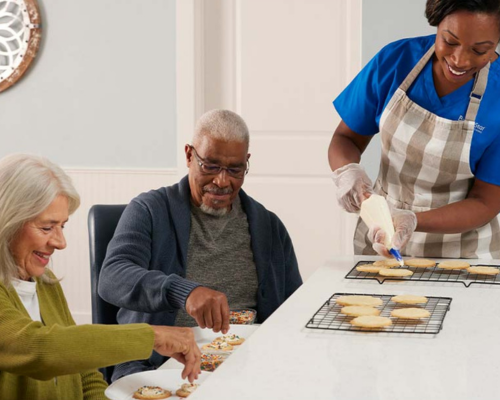Caring for a loved one diagnosed with early-onset Alzheimer's can be a challenging journey, filled with uncertainties and emotional hurdles. As they navigate through the complexities of this condition, it becomes crucial for caregivers to arm themselves with knowledge, patience, and compassion. This comprehensive guide offers actionable strategies and insights to support caregivers in providing adequate care for individuals battling early-onset Alzheimer's.



Caring for a loved one with early onset Alzheimer's demands a multifaceted approach, encompassing emotional support, practical caregiving strategies, and comprehensive planning for the future. By embracing a compassionate, informed, and proactive approach to caregiving, individuals and families can navigate the challenges of early-onset Alzheimer's with resilience and grace. Remember, you are not alone in this journey. A wealth of resources, support networks, and healthcare professionals are dedicated to assisting you and your loved one every step of the way.
Understanding Early-Onset Alzheimer's
Early-onset Alzheimer's disease affects individuals under the age of 65. Often, signs and symptoms manifest between the ages of 30 and 60. Recognizing the early signs is pivotal for timely intervention and care planning. Symptoms can include memory loss, difficulty in planning or solving problems, changes in mood or personality, and confusion with time or place.Creating a Supportive Environment
A supportive living environment is essential for individuals with early-onset Alzheimer's. This includes safety measures to prevent falls, easy-to-navigate spaces, and adaptive equipment to facilitate daily activities. Enhancing home safety can significantly improve the quality of life for both the individual and the caregiver.Effective Communication Strategies
As the disease progresses, communication becomes increasingly challenging. Employing simple, straightforward language, maintaining eye contact, and showing patience during conversations can significantly aid in effective communication. Understanding and responding to non-verbal cues becomes crucial as verbal communication skills decline.
Nutrition and Physical Health
Maintaining a balanced diet and regular physical activity is essential for individuals with early-onset Alzheimer's. Nutritious meals can help manage symptoms and improve overall health, while physical exercise can enhance mood, cognitive function, and physical well-being. Consulting with healthcare professionals to tailor dietary and exercise plans is recommended.Managing Behavioral Changes
Behavioral and psychological symptoms of dementia (BPSD) can be among the most challenging aspects of care. Strategies to manage these changes include creating a calm environment, establishing routines, and identifying triggers that lead to agitation or aggression. Non-pharmacological interventions should always be the first approach, with medication considered only when necessary and under the guidance of a healthcare provider.Legal and Financial Planning
Early planning for legal and financial matters is critical. This includes setting up powers of attorney, living wills, and financial planning for future care needs. Engaging with legal professionals who specialize in elder law can provide guidance and ensure that all legal documents are in order.Support for Caregivers
Caregivers themselves require ample support to manage caregiving's emotional and physical toll. Seeking support groups, counseling services, and respite care can provide necessary breaks and emotional support. Educating oneself about the disease, joining caregiver networks, and utilizing local resources can empower caregivers and reduce feelings of isolation.
Innovations in Care
Staying informed about the latest research and innovations in Alzheimer's care can offer new strategies for managing symptoms and improving quality of life. This includes pharmacological treatments, therapeutic activities, and technological aids to support cognitive function and daily living activities.BrightStar Care Fairfax: A Partner in Alzheimer's Care
BrightStar Care Fairfax stands out as a beacon of support and professional care for families navigating the complexities of early-onset Alzheimer's. Recognizing the unique challenges faced by those under 65 with Alzheimer's, BrightStar Care Fairfax offers tailored services designed to enhance the quality of life for individuals and provide much-needed relief for caregivers.Personalized Care Plans
Understanding that every individual's journey with Alzheimer's is unique, BrightStar Care Fairfax focuses on creating personalized care plans. These plans are developed in close collaboration with families, healthcare professionals, and the individual affected by Alzheimer's to ensure that care is holistic, comprehensive, and tailored to meet the evolving needs of the patient.Expert Caregiving Team
BrightStar Care Fairfax boasts a team of highly trained and compassionate caregiving professionals. Specializing in Alzheimer's and dementia care, their caregivers are equipped with the latest techniques and knowledge to manage behavioral changes, communication challenges, and the physical care needs of those with early-onset Alzheimer's. Continuous training ensures the team stays updated on the best practices and innovative care strategies.Support for Families
Recognizing the emotional and logistical challenges that come with caring for a loved one with early-onset Alzheimer's, BrightStar Care Fairfax extends its support beyond the individual to the entire family. BrightStar Care ensures that families are not alone in this journey, from offering respite care to allow caregivers much-needed breaks to providing guidance on navigating the healthcare system and planning for the future.
Specialized Services
BrightStar Care Fairfax offers a range of specialized services to address the specific needs of individuals with Early-Onset Alzheimer's, including:- Safety and Mobility Assistance: Implementing safety measures in the home to prevent falls and ensure a safe living environment.
- Memory Care Activities: Engaging individuals in cognitive and physical activities tailored to their abilities, promoting mental stimulation and physical health.
- Medication Management: Assisting with medication administration to ensure that treatments are followed as prescribed and managing symptoms effectively.
- Companion Services: Providing companionship to combat the isolation often accompanying Alzheimer's, enhancing the individual's quality of life through social interaction and engagement.
A Commitment to Excellence
BrightStar Care Fairfax's commitment to excellence in Alzheimer's care is evident in its personalized approach, expert team, and comprehensive support services. By partnering with BrightStar Care, families gain a trusted ally in their caregiving journey, ensuring their loved one receives the highest care and support.Community Resources and Support
Leveraging community resources such as adult day care centers, home health services, and Alzheimer's associations can provide additional support and relief for caregivers. These resources often offer educational programs, support groups, and services tailored to the needs of individuals with Alzheimer's and their families.Caring for a loved one with early onset Alzheimer's demands a multifaceted approach, encompassing emotional support, practical caregiving strategies, and comprehensive planning for the future. By embracing a compassionate, informed, and proactive approach to caregiving, individuals and families can navigate the challenges of early-onset Alzheimer's with resilience and grace. Remember, you are not alone in this journey. A wealth of resources, support networks, and healthcare professionals are dedicated to assisting you and your loved one every step of the way.
